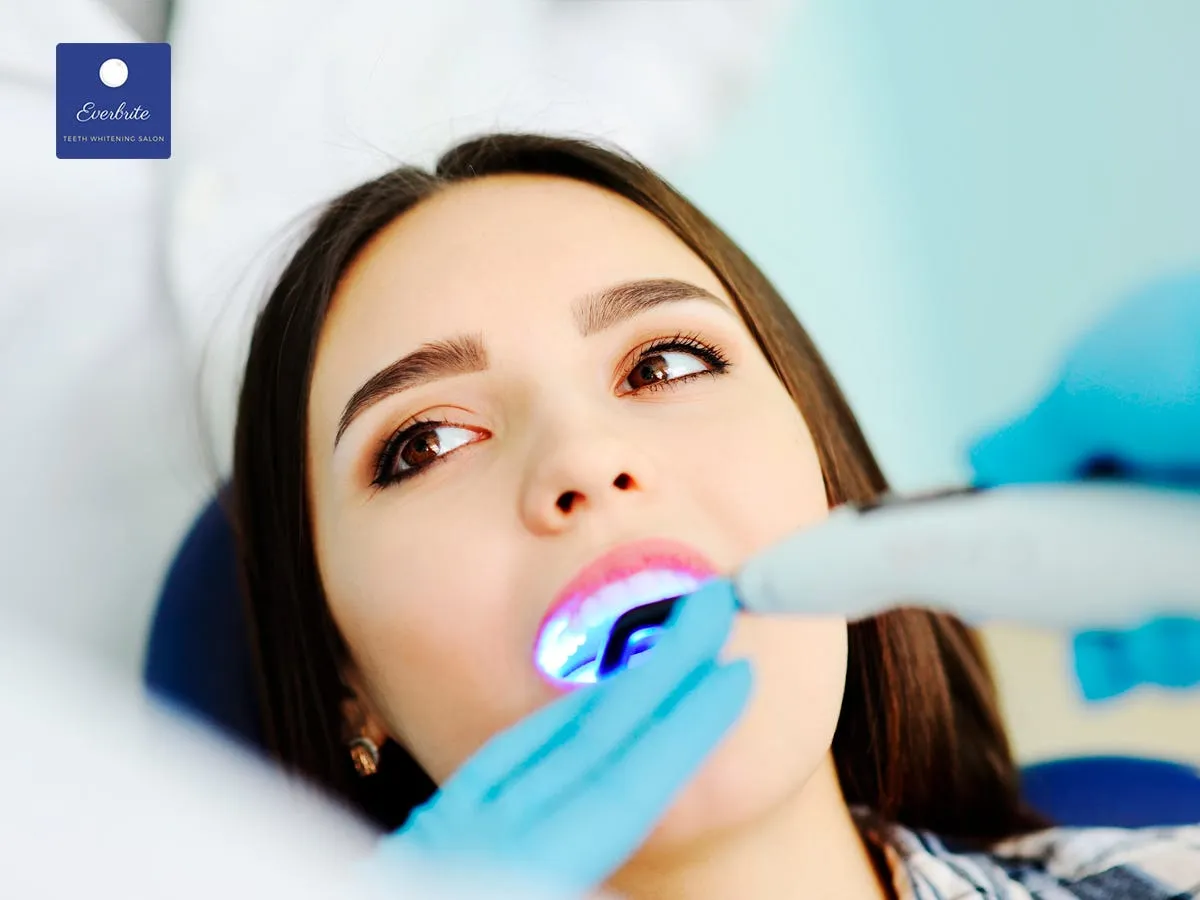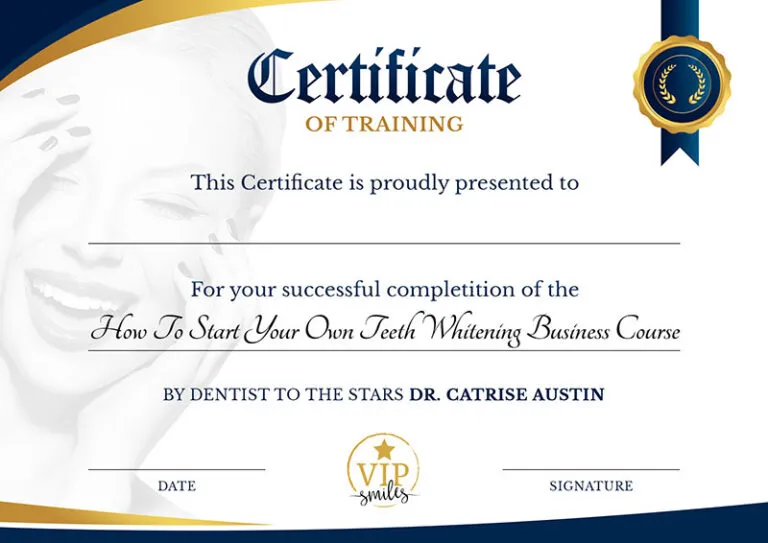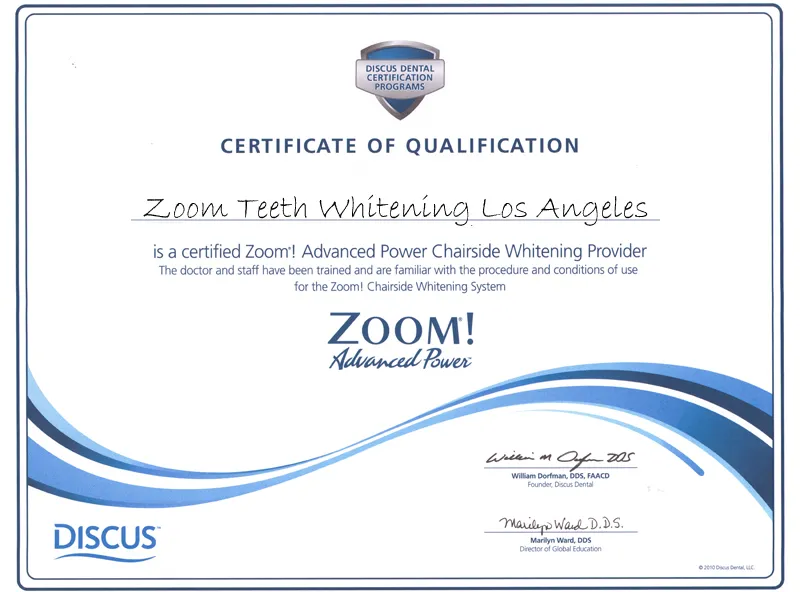Understanding Teeth Whitening Certification
Teeth whitening has surged in popularity, making it a lucrative field for dental professionals and those seeking to expand their skillset. But, entering this field isn’t just about offering services it is about acquiring the right knowledge, skills, and credentials. Teeth whitening certification provides a structured pathway to learn the techniques, understand the science, and adhere to safety protocols. This introduction delves into the essential aspects of teeth whitening certification, providing a comprehensive overview of why it’s crucial for professionals in the dental and cosmetic industries. This certification ensures that practitioners are equipped to deliver safe, effective, and ethical teeth whitening treatments, ultimately benefiting both the professionals and their clients.
What is Teeth Whitening Certification?
Teeth whitening certification is a specialized training program that equips individuals with the knowledge and skills needed to perform teeth whitening procedures safely and effectively. These programs cover a range of topics, including the anatomy of teeth, the science behind whitening agents, different whitening methods, client consultation, and safety protocols. Certification can vary in scope and depth, from basic courses that cover the fundamentals to more advanced programs that delve into specialized techniques and technologies. Completing a certification program demonstrates a commitment to professional development and a dedication to providing high-quality care. It ensures that practitioners are well-versed in the latest techniques, materials, and best practices, leading to better outcomes and increased client satisfaction.
Importance of Certification for Professionals

For professionals, certification is a cornerstone of credibility and expertise. It signifies that the practitioner has met a set of standards, completed a structured training program, and demonstrated competency in the field. Certification enhances a professional’s reputation, builds trust with clients, and opens up opportunities for career advancement. In addition, it demonstrates that you are committed to providing safe and effective treatments, adhering to industry standards, and staying abreast of the latest advancements. Clients are more likely to trust a certified professional, knowing they have the necessary skills and knowledge to deliver optimal results. Moreover, certification can also provide a competitive edge in the job market, allowing professionals to stand out from the competition. It is a means to continuously improve their skills, and increase their value within the industry.
Benefits of Certification for Clients
For clients, choosing a certified teeth whitening professional offers several key advantages, primarily centered around safety, effectiveness, and peace of mind. Certification ensures that the practitioner has been trained to perform teeth whitening procedures safely, minimizing the risk of complications or adverse effects. Certified professionals are knowledgeable about the various whitening methods, the specific agents used, and how they interact with different types of teeth. This expertise enables them to select the most appropriate treatment plan, ensuring effective results while minimizing the risk of sensitivity or damage. Clients can trust that they are receiving a service from an individual who prioritizes their health and well-being. Choosing a certified professional allows the client to have confidence that the service is being performed by an expert. It offers assurance and confidence in the service being provided.
Top 5 Teeth Whitening Certification Programs Near You
Finding the right teeth whitening certification program near you can be a game-changer for your career. These programs vary in their curriculum, accreditation, and focus, so it’s important to choose one that aligns with your professional goals and location. The following list highlights five of the top certification programs available, offering insights into their unique features and benefits. Each program has been selected based on factors such as course content, accreditation, practical training, and location, ensuring a diverse and informative overview for those seeking to enhance their skills and expand their service offerings. Always check the specific requirements and eligibility criteria of each program before enrolling to ensure it meets your needs.
Program 1 Overview

Program 1 is a comprehensive certification course designed to provide participants with a solid foundation in teeth whitening techniques. The program typically covers the fundamentals of teeth anatomy, the science behind whitening agents, and various whitening methods, including in-office and at-home treatments. Participants will learn about client consultation, contraindications, and safety protocols. The program often includes hands-on training, allowing participants to practice techniques under the supervision of experienced instructors. This practical component is crucial for building confidence and competence in performing teeth whitening procedures. The instructors are experienced professionals, and the training environment is often well-equipped with modern technology. This program offers a well-rounded curriculum, practical hands-on training, and the potential for career advancement.
Curriculum and Course Structure
The curriculum of Program 1 is carefully structured to ensure that participants receive a thorough understanding of all aspects of teeth whitening. The course structure typically includes a combination of lectures, demonstrations, and hands-on practice. Modules cover essential topics such as teeth anatomy, the different types of stains, the science behind whitening agents, and various whitening techniques. Practical sessions allow participants to practice on models or live clients, under the guidance of experienced instructors. Participants learn about client consultation, including assessing a client’s needs, explaining the procedures, and managing expectations. The course also emphasizes safety protocols, including infection control, proper handling of materials, and recognizing and addressing potential complications. The course structure is designed to provide a balanced and immersive learning experience.
Accreditation and Recognition
Accreditation is a critical factor to consider when choosing a teeth whitening certification program. Accreditation ensures that the program meets certain standards of quality, curriculum, and instruction. Program 1 is often accredited by reputable organizations that specialize in dental or cosmetic education. Accreditation signifies that the program has undergone a rigorous review process and has been approved for meeting specific criteria. Accreditation from a recognized body gives credibility to the certification and increases its value in the job market. Certification from an accredited program enhances the professional’s reputation and can lead to better career opportunities. Accreditation not only ensures the quality of the program but also may be required for professional licensing or insurance purposes, making it an essential consideration for any prospective student.
Program 2 Overview

Program 2 offers an advanced curriculum that is suitable for professionals looking to deepen their expertise in teeth whitening. This program often focuses on more specialized techniques and technologies, such as laser whitening, advanced stain removal, and managing complex cases. The program typically attracts experienced dental hygienists, dentists, and other professionals who already have a foundational understanding of teeth whitening. The curriculum may include advanced lectures, case studies, and extensive hands-on practice. Participants will learn to utilize the latest tools and technologies. Program 2’s advanced curriculum is designed to provide participants with the advanced skills, knowledge, and confidence they need to excel in the field of teeth whitening.
Curriculum and Course Structure
The course structure of Program 2 is carefully designed to provide an in-depth understanding of advanced teeth whitening techniques and technologies. The curriculum covers a broad range of topics, including the application of laser whitening, the use of various whitening agents, and detailed protocols for managing complex cases. The structure typically includes lectures, workshops, and extensive hands-on practice, allowing participants to gain practical experience. Participants learn to assess challenging cases, understand different types of stains, and apply specialized techniques to achieve optimal results. The course structure may also include modules on practice management, marketing, and client communication, helping professionals grow their practices. The program provides a practical, immersive, and well-rounded educational experience.
Accreditation and Recognition
Accreditation is a key factor in establishing the credibility and quality of advanced certification programs. Program 2 often holds accreditation from recognized dental or cosmetic organizations. Accreditation is a testament to the program’s high standards of training, curriculum, and instruction. Accreditation from a recognized body signifies that the program meets or exceeds the industry’s standards, ensuring that participants receive the highest level of training. It also enhances the value of the certification, increasing its recognition and acceptance among employers and clients. Accreditation may also be required for professional licensing or insurance purposes, underscoring its importance. Accreditation is a crucial component of choosing a credible and valuable teeth whitening certification program.
Program 3 Overview

Program 3 is designed for dental assistants and hygienists, providing them with specialized skills in teeth whitening. This program focuses on hands-on training and practical application, ensuring that participants develop confidence and proficiency in performing teeth whitening procedures. The curriculum covers essential topics such as the anatomy of teeth, types of stains, and various whitening methods. The program emphasizes client communication, safety protocols, and the importance of maintaining ethical standards. Participants will gain practical experience by performing procedures under the supervision of certified instructors. This program is geared towards practical application and hands-on experience. The goal is to provide participants with the skills, knowledge, and confidence they need to excel in the field of teeth whitening.
Curriculum and Course Structure
The curriculum of Program 3 is specifically tailored to the needs of dental assistants and hygienists. The course structure is designed to provide a balanced approach to theoretical knowledge and practical skills. It typically includes lectures, demonstrations, and extensive hands-on practice. Participants will learn about the various teeth whitening methods, including in-office and at-home treatments, as well as safety protocols. They’ll also receive detailed training on client consultation, including assessment, procedure explanation, and managing expectations. The course structure will emphasize practical application, providing ample opportunities for participants to practice techniques under the guidance of experienced instructors. The curriculum is designed to ensure a well-rounded educational experience, equipping dental assistants and hygienists with the skills they need.
Accreditation and Recognition
Accreditation is a vital factor for ensuring the quality and value of Program 3. The program typically holds accreditation from organizations recognized within the dental industry. Accreditation ensures that the program meets high standards of training and instruction. Accreditation from a recognized body signifies that the program has undergone a rigorous review process and has been approved for meeting specific criteria. Accreditation adds credibility to the certification, increasing its acceptance by employers and clients. Furthermore, accreditation may be required for professional licensing or insurance, highlighting its importance. Accreditation is an essential factor to consider when choosing a teeth whitening certification program.
Program 4 Overview

Program 4 provides a comprehensive certification in teeth whitening with a focus on combining in-office and at-home treatments. This program caters to professionals who want to offer a complete range of whitening services. The curriculum covers various techniques, from professional in-office procedures to custom-fitted trays and take-home kits. Program participants learn about the different types of whitening agents, the science behind them, and how to select the most suitable treatment for each client. Program 4 emphasizes client communication, treatment planning, and managing patient expectations. The program often includes extensive hands-on training, enabling participants to practice the techniques. The goal is to train professionals who can offer a full suite of whitening solutions, thereby increasing the satisfaction of their clients.
Curriculum and Course Structure
The course structure of Program 4 is meticulously designed to provide a comprehensive understanding of combined teeth whitening approaches. The curriculum combines theoretical knowledge with hands-on practice. It covers in-office procedures, from the application of whitening agents to the use of specialized lighting. Participants will also learn about the fabrication and fitting of custom trays for at-home treatments, ensuring optimal results and patient comfort. The curriculum also delves into client consultation, assessing needs, and choosing the most appropriate whitening strategy. The course includes lectures, demonstrations, and hands-on practice sessions. Participants will gain the practical experience and confidence they need to offer a full range of whitening solutions. The course offers a detailed and well-rounded educational experience, preparing professionals to meet client needs.
Accreditation and Recognition
Accreditation is a critical factor in assessing the value and credibility of Program 4. The program often carries accreditation from organizations recognized within the dental or cosmetic industries. Accreditation ensures that the program meets rigorous standards of quality in training and instruction. Accreditation from a recognized body shows that the program adheres to specific criteria and has undergone a review process. Accreditation adds credibility to the certification, enhancing its recognition among employers and clients. Additionally, it might be required for professional licensing or insurance purposes, emphasizing its importance. Accreditation is a key consideration when deciding on a teeth whitening certification program.
Program 5 Overview

Program 5 is a specialized program designed for those who want to focus on the business and marketing aspects of teeth whitening services. This program focuses on the business side of things, providing participants with the knowledge and skills to build a successful practice. The curriculum encompasses areas such as practice management, marketing strategies, client acquisition, and the legal and ethical considerations of teeth whitening. Participants learn how to develop a business plan, create marketing materials, and attract and retain clients. Program 5 aims to equip participants with the business acumen required to thrive in the teeth whitening field. This program offers both theoretical knowledge and practical insights, preparing participants to excel in their careers.
Curriculum and Course Structure
The course structure of Program 5 is meticulously designed to provide a practical understanding of the business and marketing aspects of teeth whitening services. The curriculum offers a combination of theoretical and practical modules, including practice management, marketing strategies, and client acquisition techniques. Participants will learn how to develop a robust business plan, design effective marketing materials, and implement strategies to attract and retain clients. It also includes modules covering legal and ethical considerations. The course may feature guest speakers and real-world case studies. The course structure will provide a comprehensive and practical learning experience. It equips participants with the necessary tools to succeed in the business side of teeth whitening.
Accreditation and Recognition
Accreditation is a crucial factor to consider when evaluating the credibility and value of Program 5. The program is often accredited by organizations specializing in business, healthcare, or continuing education. Accreditation ensures the program adheres to high standards of curriculum and instruction. Accreditation from a recognized body ensures that the program meets specific criteria and has undergone a thorough review. Accreditation enhances the value of the certification, making it more respected among employers and clients. The program may be recognized by professional organizations, which can further enhance its value. Accreditation is an essential aspect when selecting a teeth whitening certification program.
Choosing the Right Certification Program
Selecting the right teeth whitening certification program requires careful consideration of multiple factors. These factors include your professional goals, your budget, the program’s accreditation, and its location. Consider what skills and knowledge you aim to gain. Choose a program that matches your career goals and provides the necessary training for the services you want to offer. Examine the curriculum, course structure, and instructor credentials to ensure the program delivers comprehensive and high-quality training. Assess the program’s accreditation, which confirms its adherence to industry standards. Factor in the cost, time commitment, and location of the program to ensure it aligns with your practical needs. Thoroughly evaluating these factors ensures that you choose a program that is valuable, effective, and aligned with your career aspirations.
Factors to Consider When Selecting a Program
When selecting a teeth whitening certification program, you should carefully evaluate key aspects. Evaluate the program’s curriculum. It should cover essential topics such as teeth anatomy, whitening agents, various techniques, client consultation, and safety protocols. Assess the course structure, including lectures, demonstrations, and hands-on practice. Evaluate the instructors’ credentials and expertise. Accreditation from a recognized organization ensures that the program meets specific standards. Consider the cost of the program. Also, assess the duration of the course and how well it fits your schedule. Finally, consider the location and accessibility of the program. A thorough evaluation of these factors ensures you select a program that is valuable, effective, and suits your needs.
Cost and Time Commitment
The cost and time commitment required for teeth whitening certification programs can vary. The cost of the program can range depending on its length, curriculum, and the resources it offers. Additional costs may include materials, textbooks, and fees for exams. Consider the time commitment of the program, including the duration of the courses, any additional study time, and travel. Some programs offer flexible schedules, including online modules, evening classes, and weekend workshops. Consider the program’s payment options and any available financing. Take these factors into account to make an informed decision that balances the value of the certification with your budget and schedule.
Location and Accessibility
When selecting a teeth whitening certification program, location and accessibility are key factors. Consider the program’s physical location and whether it is conveniently located near you. If the program requires travel, factor in the cost and time. Explore online certification programs, which offer flexibility and convenience. Consider the program’s schedule. Ensure it aligns with your existing commitments. Evaluate the program’s accessibility. Consider factors like transportation, parking, and facilities. Assess whether the program is accessible to people with disabilities. Considering these factors makes certain that the chosen program is easily accessible.
Career Opportunities After Certification
Obtaining teeth whitening certification can open doors to several career opportunities. Certified professionals can work in dental clinics, cosmetic dentistry practices, or specialized teeth whitening clinics. They can also start their own businesses. Certified individuals are also in demand in medical spas and wellness centers. They can perform in-office whitening procedures and provide clients with take-home whitening kits. Certification improves the chance of landing a job. It also increases the potential for higher pay. Additionally, you can work as an independent contractor, offering whitening services at various locations. Certification provides a solid foundation for a successful career in the field of teeth whitening.
Roles and Responsibilities of a Certified Whitening Professional
Certified teeth whitening professionals have several roles and responsibilities. They conduct client consultations to assess their needs and determine the most suitable treatment plan. They perform in-office whitening procedures, following safety protocols. They offer clients personalized advice and education. They maintain detailed records of treatments and client progress. Certified professionals must ensure client safety, follow strict hygiene standards, and manage potential complications. They stay current with the latest techniques. They are also responsible for maintaining their certification through continuing education. These responsibilities require strong clinical skills, excellent communication skills, and a commitment to ethical practices.
Salary Expectations and Job Market Outlook
The job market for certified teeth whitening professionals is growing. The demand for cosmetic dental services is also on the rise. The salary expectations for certified professionals vary, depending on the location, experience, and type of practice. In general, certified professionals can anticipate competitive salaries. Factors like advanced skills, additional certifications, and entrepreneurial endeavors can impact earnings. The job market outlook is positive, with opportunities for professional development and career advancement. The increasing demand for cosmetic dentistry ensures that certified professionals can look forward to a rewarding and fulfilling career.
Maintaining Your Certification
Maintaining your teeth whitening certification is vital for career longevity. It ensures you remain current with the latest developments and best practices. Certification maintenance usually involves completing continuing education requirements. These requirements ensure that professionals stay updated with the field’s advancements. Continuing education can include attending workshops, taking advanced courses, or participating in professional conferences. It is also important to keep a current CPR certification and adhere to ethical guidelines. Certification renewal also may require proof of work hours. Maintaining your certification provides a path to career growth and ensures that you consistently provide safe and effective treatments.
Continuing Education Requirements
Continuing education requirements are a cornerstone of maintaining teeth whitening certification. These requirements typically involve completing a certain number of hours of continuing education credits. These credits can be earned by attending workshops, seminars, online courses, or professional conferences. The specific requirements vary by program and certification body. You must stay up-to-date on new techniques, technologies, and safety protocols. Keeping current with industry trends enhances your knowledge and skills. It also ensures compliance with ethical standards and best practices. Continuing education is a critical aspect of maintaining professional competence and improving your career prospects.
Staying Updated with Industry Trends
Staying updated with industry trends is essential for teeth whitening professionals. This helps you provide the best possible care to your clients. You must stay current on emerging techniques and technologies, such as new whitening agents and advanced delivery methods. Keep up with the latest research, clinical studies, and best practices. Engage with industry publications, professional organizations, and online resources. Consider attending industry conferences and trade shows to learn from experts and network with peers. By remaining informed, you can provide safe, effective, and cutting-edge treatments, improving your career prospects and enhancing client satisfaction. Staying current with industry trends ensures ongoing development.
In conclusion, obtaining a teeth whitening certification is a strategic investment for professionals. It significantly enhances credibility, client trust, and career prospects. Certification ensures a thorough understanding of the scientific principles and techniques. Choosing the right program, considering accreditation, and meeting continuing education requirements are essential steps for success. Staying informed about industry trends is critical for continued growth and excellence. By prioritizing certification and continuous learning, professionals can deliver exceptional teeth whitening services and advance their careers. This provides benefits for both the practitioners and clients.
